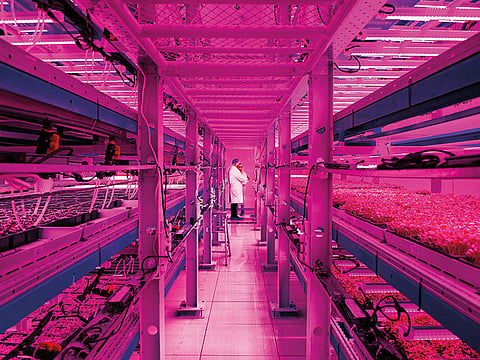Sustainable farming gathers steam in the UAE
New technologies allow growing of fruit and vegetables with as much as 90 per cent reduction in water usage

Growing crops sustainably in the Gulf is no easy feat. The arid environment, coupled with a severe lack in water and arable land, as well as depleting natural resources, have posed great challenges to the sector.
Even though the UAE is importing up to 85 per cent of its food supplies, a number of environmentally friendly initiatives across the Emirates are attempting to change the status quo.
“There are several projects currently under way where low-water farming using world-class hydroponic technology will reduce the requirement to import fruit and vegetables, or allow production involving as much as a 90 per cent reduction in water usage,” says Nicholas Lodge, Managing Partner of the Abu Dhabi-based agriculture consultancy Clarity. “For the UAE, with low supplies of natural water and a reliance on desalinated water, a key issue is the smart use of water in agriculture, which accounts for approximately 80 per cent of all water usage in the region.”
The smart production of food locally can help alleviate import requirements and as a result minimise environmental impact in a country that has one of the highest per capita carbon footprints in the world.
“The UAE is also leading the way in research in saline and dry condition agriculture, with the field testing of crops and cultivars, irrigation technologies and cultivation methodologies, all of which, when put in practice, can benefit the country and region in terms of increased production with reduced input,” Lodge says. “There are also a number of initiatives from the likes of Abu Dhabi Food Control Authority and Abu Dhabi Farmers’ Services Centre to encourage sustainable local agricultural practices.”
In Dubai, the International Centre for Biosaline Agriculture (ICBA) is leading in the field, using modern irrigation systems and net houses to have a more controlled environment with improved yield compared to open fields. “If you combine it with hydroponics, which is a major water-saving technology, it’s significant and very promising,” says Dr Khalil Ammar, Principal Scientist in Hydrogeology and Water Resources Management at the centre.
“Using alternative resources, like saline and brackish water, in agriculture and selecting the right crops that could be grown with this water means yield will increase and agriculture will be sustainable.”
Overpumping of groundwater in the past has been detrimental to many farmers across the country. “Using treated wastewater is another tangible solution, which could add value to the sector,” Dr Ammar says. “Combining all these with hydroponics could be beneficial because we’re trying to save water in the end.”
The centre is attempting to revive salt-affected farms by growing halophytes, which are climate-resilient and salt-tolerant plants. “They increase the diversity of the crops within the farms,” says Dr Dionysia Lyra, Halophyte Agronomist in Research and Innovation at the centre.
“Diversity is another direction that future agricultural models should take into account,” Dr Lyra adds.
Different crops that can grow with highly saline water such as quinoa were also tested out in several locations across the UAE.
“We’re now trying to introduce more vertical farming because it’s a very promising method that could save a lot of water,” Dr Ammar adds. “We’re also advising farmers to use more soil amendments to save water in the soil.”
Omar Al Jundi, Founder and Chief Executive of Badia Farms in Dubai, has already jumped on the vertical farming bandwagon. “The biggest element of the sustainable revolution is water, especially in this part of the world where we’ve depleted our water resources through the years,” he says. “We recycle 90 per cent of our water while in the open fields you water once and it’s gone — we use the water up to ten times.”
His facility in Al Quoz grows all sorts of leafy greens that are usually flown into the UAE. “That has a big impact on the yield, while using a much smaller space,” says Al Jundi, originally from Saudi Arabia. “The system will become solar-powered too and by growing locally, we’re reducing carbon footprint on the planet. Sustainable agriculture is the only way forward for us to grow — we’re an agriculturally challenged region but modern and sustainable farming fits in with preserving our resources.”

